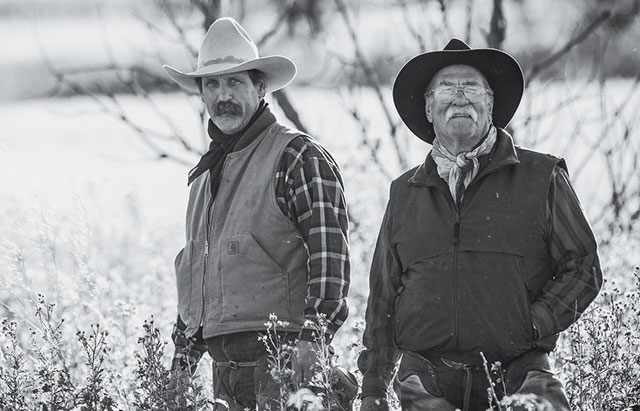sierraclub.org - sierra magazine - may/june 2013 - warren buffett's coal problem
To run his coal trains, the billionaire investor needs to seize land from a bunch of Montana cowboys. That's not going over very well.
By Marc Gunther

The proposed Tongue River rail line would cut right through the middle of Clint (left) and Wally McRae's Rocker Six ranch. "Why should we have to give up our property rights for this railroad?" Clint asks. | Photo by Tony Demin
Wally, Clint, and many of their neighbors—including a small settlement of Amish farmers who don't even use electricity, as well as numerous members of the Northern Cheyenne tribe, whose ancestors have lived here for centuries—have joined together to fight the coal mine, the railroad, and plans to expand the ports in Washington and Oregon that are needed to ship the coal to Asia. Backing the cowboys and Indians are the Sierra Club, the National Wildlife Federation, and the Northern Plains Resource Council, a local conservation group. They're up against Arch Coal, BNSF, and two of America's richest men: Buffett and Forrest E. Mars Jr., the reclusive candy billionaire who owns a 100,000-plus-acre ranch in Birney, Montana, not far from Colstrip. Mars, 81, fought Otter Creek and the Tongue River Railroad until, in an unexpected twist, he bought a share of the rail line—and its track was routed around his property. (See "A Candy Billionaire Solves His NIMBY Problem," page 49.)
The stakes are high. Otter Creek contains about 1.2 billion tons of coal. If the Tongue River Railroad is built and ports are expanded, other mines could follow.
"There are a few crucial choke points on this planet where we have some chance of stanching the endless flow of carbon into the atmosphere," Bill McKibben, the activist and founder of 350.org, tells me. "On that list, none may be more important than Montana."
"This steamrolling over people's property rights is a dangerous thing. Where's the public necessity to ship coal to China?"
What does Warren Buffett think about energy and climate? Finding out is no easy task. Unlike his good friend Bill Gates (who sits on Berkshire's board of directors), Buffett has said almost nothing about either topic, and Berkshire has no environmental policy, as best as anyone can tell. (Buffett declined to be interviewed for this article.) In addition to its substantial holdings in wind and solar power, Berkshire's investments include a 1.98 percent stake in ConocoPhillips, one of America's largest oil companies, and a 4.37 percent stake in Phillips 66. MidAmerican Energy Company, the same Iowa-based utility that runs all that wind power, also produces nearly half of its electricity from burning coal. It will burn less in the future, however, after reaching a settlement with the Sierra Club under which it will phase out coal burning at five units, clean up another two, and build a solar installation at the Iowa State Fairgrounds.
Another subsidiary of MidAmerican Energy Holdings is the utility PacifiCorp, which operates in six western states. It has an even dirtier mix, with 58 percent of its electricity from burning coal. (The national average is about 40 percent.) "PacifiCorp is stuck in the dark ages," the Sierra Club's Nilles says.
Cathy Woollums, a senior vice president at MidAmerican Energy Holdings who guides the company's environmental work, notes that PacifiCorp has added a gigawatt of wind generation—representing nearly 10 percent of its generating capacity—since it was acquired by MidAmerican in 2006. It is also accelerating the shutdown of its coal plant in Helper, Utah, by five years, to 2015.
By phone, Woollums tells me that MidAmerican's utilities would like to substitute cleaner sources of energy for coal where it is cost-effective to do so. But, she says, the company also has to keep electricity affordable to satisfy customers and regulators. "We don't set policy," Woollums says. "Without a clear [federal] climate policy, it's difficult for us to move forward quickly."
But Berkshire's BNSF Railway, which wants to expand its coal business, has used its influence to oppose government efforts to regulate the industry. As the largest hauler of coal in the country, BNSF is a member of the American Coalition for Clean Coal Electricity, which fights EPA efforts to regulate coal pollution. It's also a founding member of the Alliance for Northwest Jobs and Exports, which is campaigning for four proposed coal-export terminals in Washington State and Oregon—crucial for the industry as domestic demand for coal continues to decline. Nilles calls BNSF "one of the very worst actors when it comes to lobbying and promoting expanded coal use."
Backers of the export terminals say that they will create needed jobs and tax revenues. Reached by email, a BNSF spokesperson says that "railroads are the most environmentally friendly mode of transportation"—which is true, but doesn't account for what's being transported. Matt Rose, the railway's chairman and CEO, told Washington State's Columbian newspaper last August that developing nations in Asia want low-cost energy, just as the United States did when it was industrializing. As to whether supplying Asia with coal would accelerate global warming, Rose said, "I don't address climate change, because I'm not qualified to."
Buffett hasn't really addressed climate change, either. In response to a question at Berkshire's annual meeting in 2007, he did say, "I think the odds are good that global warming is serious." But four years later, at his urging, Berkshire Hathaway shareholders rejected a proposal that would have required the company's utilities to set goals for reducing greenhouse gas emissions. Last year, hoping to get Buffett's attention, Canadian climate activists threatened to block a BNSF train carrying coal to Vancouver. The railroad obtained an injunction against the blockade, and 13 protesters were arrested. Buffett remained silent.
1 | 2 | 3 | next >>